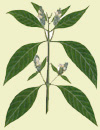| Latin Names | Adhatoda zeylanica Medic. syn. Adhatoda vasica Nees (Acanthaceae) |
| English Names | Malabar nut, Vasaka |
| Sanskrit Names | Vasa, Shwetavasa, Vasaka |
| Hindi Names | Arusa, bansa |
 Distribution: Distributed throughout India, up to an altitude of 1,300 m. Habit: A. zeylanica is an evergreen, gregarious, stiff, perennial shrub. The leaves are elliptic-lanceolate or ovate-lanceolate, entire, hairy, light green above, dark below and leathery; the flowers are large, white with red-or yellow-barred throats and in spikes, with large bracts; the capsules are longitudinally channelled; the seeds globular. Principle constituents: Several alkaloids are present in the drug and its chief principle is a quinazoline alkaloid, vasicine. The leaves are rich in vitamin C and carotene and yield an essential oil. Indications: The shrub is the source of the drug, vasaka, well known in indigenous systems of medicine for its beneficial effects, particularly in bronchitis. The leaves, flowers, fruits and roots are extensively used for treating cold, cough, whooping-cough, chronic bronchitis and asthma. It acts as a sedative-expectorant, antispasmodic and anthelmintic. The leaf-juice is stated to cure diarrhea, dysentery and glandular tumour, and, is given as an emmenagogue. The powder is reported to be used as a poultice on rheumatic joints, as a counter-irritant on inflammatory swellings, on fresh wounds, urticaria and in neuralgia. Product range: Diakof, Geriforte, Koflet, Lukol, Menotab, EveCare, Koftea |
|